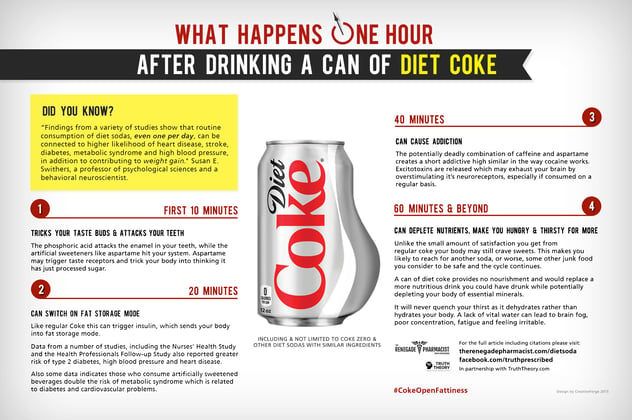We’re all guilty for reaching for a sweet treat every now and then. When that craving kicks in, you sometimes have to have super-human strength to resist, or look for an alternative option that isn’t packed full of sugar.
Over 6 million of us in the UK choose to drink fizzy drinks every year, and many of us think we’re being ‘healthy’ by opting for diet fizzy drinks. But are they actually damaging your diet?
We all know that full-fat fizzy drinks are bad for your health - packed full of calories, sugar and additives, these will definitely pave way to a diet disaster. But now it’s time to look closely at the diet fizzy drinks facts. Will diet coke help you lose weight? Will they be a good addition to a healthy diet plan? What are the side effects of drinking diet fizzy drinks?
.gif?width=632&name=giphy%20(1).gif)
Soda, fizzy drinks, pop - whatever you call it, it’s time to delve into the land of diet fizzy drinks facts so you can decide if you want these in your life. As with any change, you can only decide when you become aware of what they actually do to your body…
Diet Fizzy Drinks Facts: Are they damaging your diet?
Will diet drinks help me lose weight?
In a bid to save on calories and lead a healthy lifestyle, many of us reach for diet or ‘zero’ versions of our favourite soft drinks to sedate the sweet tooth. After all, logic suggests that if we drink a diet can of fizz, instead of a full-fat 140-calorie can, we’ll have a lower calorie consumption through the day, right?
Maybe not…
The Diet Fizzy Drink Experiment:
A study by the University of Illinois examined the dietary habits of more than 22,000 US adults and calories consumed. They studied the association between the consumption of different drinks and the amount of calories consumed as a result of the beverages.
Over ten years, they tracked participants intake of food and beverages, including diet fizzy drinks, coffee and alcohol, and found surprising results.
The Results:
The results saw that consuming diet drinks could lead to bingeing on extra sugars and fat-laden foods in order to compensate for the drinks’ empty calories. Alcohol was of course the number one drink that led to a large increase in daily calories (hello, drunken munching!), followed by sugar-sweetened drinks, coffee, diet beverages and tea. It appeared that those who drank diet drinks and coffee obtained a greater percentage of their daily calories from discretionary foods.

Credit: Graphic by Julie McMahon
The participants may have allowed themselves to eat more ‘naughty’ treats from the calories they saved on non-calorie drinks… but there is also evidence that artificially-sweetened drinks contribute to weight gain, as well as a myriad of other detrimental effects to your health - EEK!
What are the side effects of fizzy drinks?
Weight gain?! From a diet drink??
You may think that diet soda would fill you with non-caloric bubbles and liquid, stopping you from getting the hunger, but you would be wrong. Take a look at what happens 20 minutes after drinking Diet Coke:
First 10 minutes: The Phosphoric Acid attacks your teeth. Sweeteners trigger taste receptors and trick your body into thinking you just consumed sugar, but there is actually nothing of nutritional value in your tummy.
After 20 minutes: Your body triggers insulin, which switches on your body’s fat storage mode. Artficial sweeteners are associated with a dip in the leptin hormone, which makes you hungrier and not as satisfied by normal portions. Chemical-ridden food and drink can't be broken down by the body, so your body makes more internal fat to keep these chemicals away from vital organs.
Plus, the artificial sweeteners and sugar alcohols can interfere with natural gut bacteria which can affect your immune and digestive system.
So this obviously shows that diet fizzy drinks can be damaging to your weight loss, but there’s actually more to come… you’ll soon be putting down that can of coke...
.gif?width=640&name=giphy%20(2).gif)
40 minutes after your can of diet coke: Your body is overly stimulated by caffeine and aspartame, and you experience a quick high (like cocaine).
After 60 minutes: Your body is still craving sweets as it just consumed something that had no calories. Your nutrients and essential minerals are depleted, and it dehydrates your body. Your thirst hasn't actually been quenched! Plus, you begin to crave more from the aftermath of the dopamine and glutamate release in the brain.
Credit: The Renegrade Pharmacist
Filling your body with items of no nutritional value and artificial sweeteners can be detrimental for your diet, and awful for your body. Internally, you’re going through a myriad of chemical reactions and too many cans are rumoured to lead to cancer, heart disease, diabetes and liver damage. All the bad things.
So while you may reach for a diet fizzy drink in the battle to avoid extra calories, be aware of what else is happening to your body. There’s no quick hack to losing weight, and reaching for a can of pop isn’t the way forward - just because it has ‘diet’ in the title, does not mean that it’s a fast-track ticket to health!
Enjoy everything in moderation and be sure to have a colourful variety in your diet - cravings can trip you up, which is absolutely fine, but remember in the long run that food is there to fuel and care for your body. So choose right!



